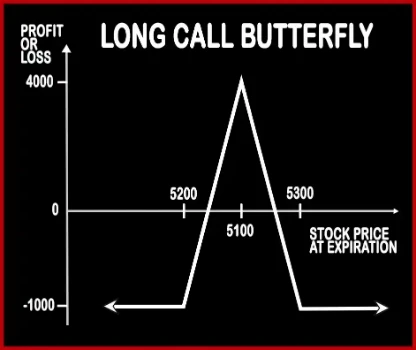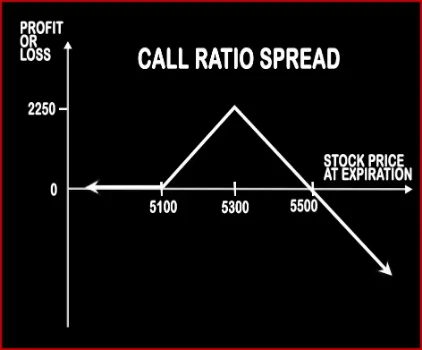Compare Strategies
| LONG CALL BUTTERFLY | RATIO CALL SPREAD | |
|---|---|---|

|

|
|
| About Strategy |
Long Call Butterfly Option StrategyA trader, who is neutral in nature and believes that there will be very low volatility i.e. expects the market to remain range bound, will implement this strategy. This strategy involves selling of 2 ATM Call Options, buying 1 ITM Call Option & buying 1 OTM Call Option of the same expiry date & same underlying asset. The difference between the strikes sho |
Ratio Call Spread Option StrategyAs the name suggests, a ratio of 2:1 is followed i.e. buy 1 ITM Call and simultaneously sell OTM Calls double the number of ITM Calls (In this case 2). This strategy is used by trader who is neutral on the market and bearish on the volatility in the near future. Here profits will be capped up to the premium amount and risk will be potentially unlimited since he is .. |
LONG CALL BUTTERFLY Vs RATIO CALL SPREAD - Details
| LONG CALL BUTTERFLY | RATIO CALL SPREAD | |
|---|---|---|
| Market View | Neutral | Neutral |
| Type (CE/PE) | CE (Call Option) | CE (Call Option) |
| Number Of Positions | 4 | 3 |
| Strategy Level | Advance | Beginners |
| Reward Profile | Limited | Limited |
| Risk Profile | Limited | Unlimited |
| Breakeven Point | Upper Breakeven = Higher Strike Price - Net Premium, Lower Breakeven = Lower Strike Price + Net Premium | Upper Breakeven Point = Strike Price of Short Calls + (Points of Maximum Profit / Number of Uncovered Calls), Lower Breakeven Point = Strike Price of Long Call +/- Net Premium Paid or Received |
LONG CALL BUTTERFLY Vs RATIO CALL SPREAD - When & How to use ?
| LONG CALL BUTTERFLY | RATIO CALL SPREAD | |
|---|---|---|
| Market View | Neutral | Neutral |
| When to use? | This strategy should be used when you're expecting no volatility in the price of the underlying. | This strategy is used by trader who is neutral on the market and bearish on the volatility in the near future. Here profits will be capped up to the premium amount and risk will be potentially unlimited since he is selling two calls. |
| Action | Sell 2 ATM Call, Buy 1 ITM Call, Buy 1 OTM Call | Buy 1 ITM Call, Sell 2 OTM Calls |
| Breakeven Point | Upper Breakeven = Higher Strike Price - Net Premium, Lower Breakeven = Lower Strike Price + Net Premium | Upper Breakeven Point = Strike Price of Short Calls + (Points of Maximum Profit / Number of Uncovered Calls), Lower Breakeven Point = Strike Price of Long Call +/- Net Premium Paid or Received |
LONG CALL BUTTERFLY Vs RATIO CALL SPREAD - Risk & Reward
| LONG CALL BUTTERFLY | RATIO CALL SPREAD | |
|---|---|---|
| Maximum Profit Scenario | Adjacent strikes - Net premium debit. | Strike Price of Short Call - Strike Price of Long Call + Net Premium Received - Commissions Paid |
| Maximum Loss Scenario | Net Premium Paid | Price of Underlying - Strike Price of Short Calls - Max Profit + Commissions Paid |
| Risk | Limited | Unlimited |
| Reward | Limited | Limited |
LONG CALL BUTTERFLY Vs RATIO CALL SPREAD - Strategy Pros & Cons
| LONG CALL BUTTERFLY | RATIO CALL SPREAD | |
|---|---|---|
| Similar Strategies | - | Variable Ratio Write |
| Disadvantage | • Due to limited lifespan of call options, you can lose the premium paid. • Limited profit which is bound in a narrow range between the two wing strikes. | • Unlimited potential loss. • Complex strategy with limited profit. |
| Advantages | • Under this strategy, a trader can book profit even when there is not volatility in the market. • Limited risks to the net premium paid. • This strategy allows you to gain more profits by investing less and limiting your losses to minimum. | • Downside risk is almost zero. • Investors can book profit from share prices moving within given limits. • Trader can maximise profit when the share closes at the upper breakeven point. |